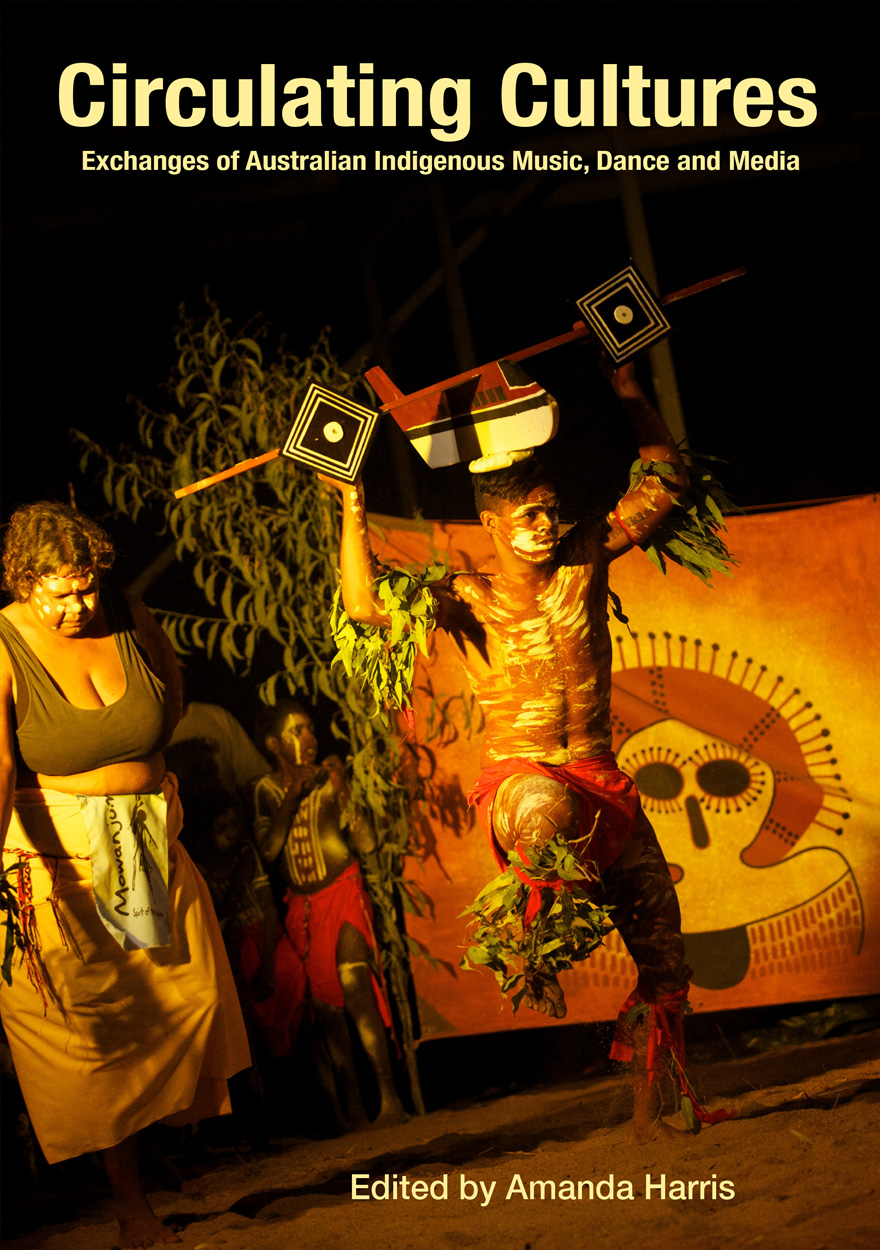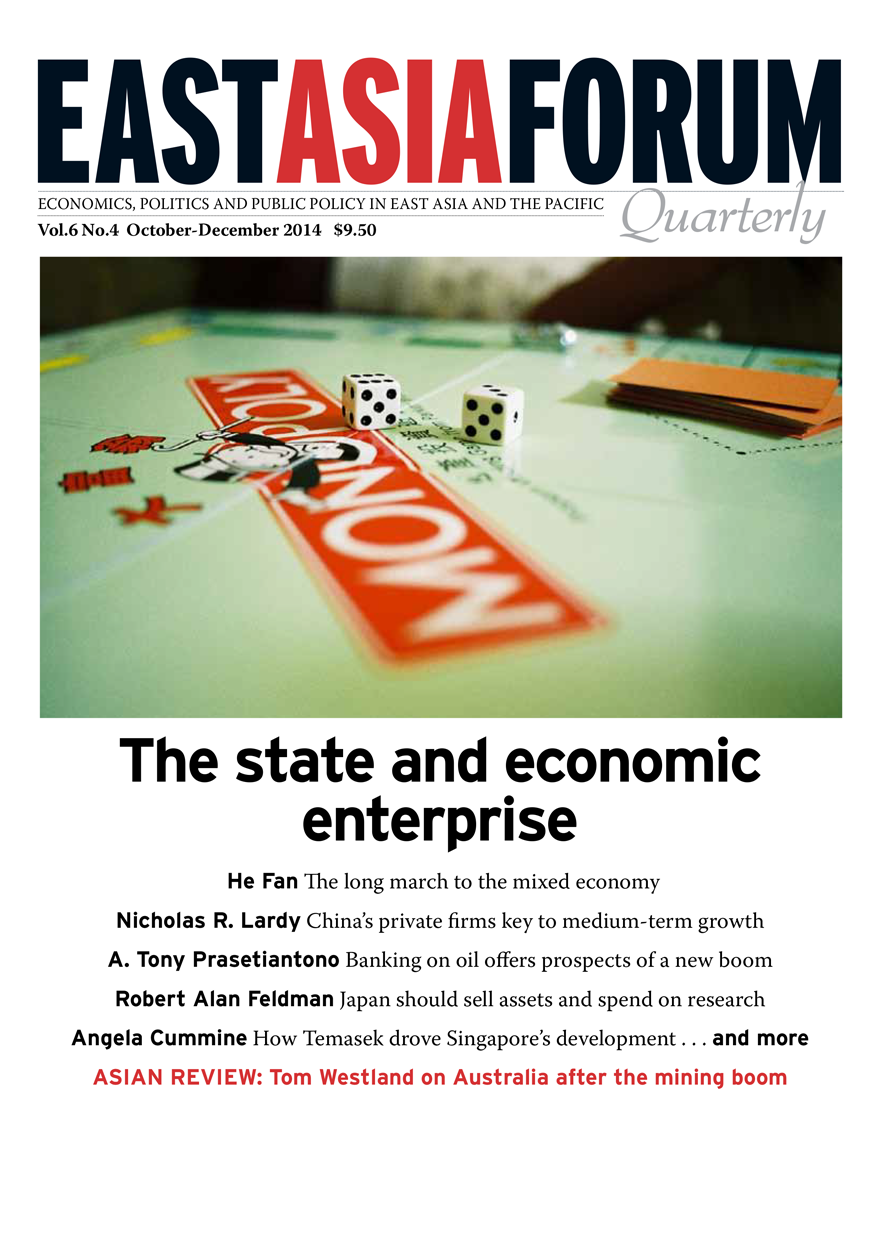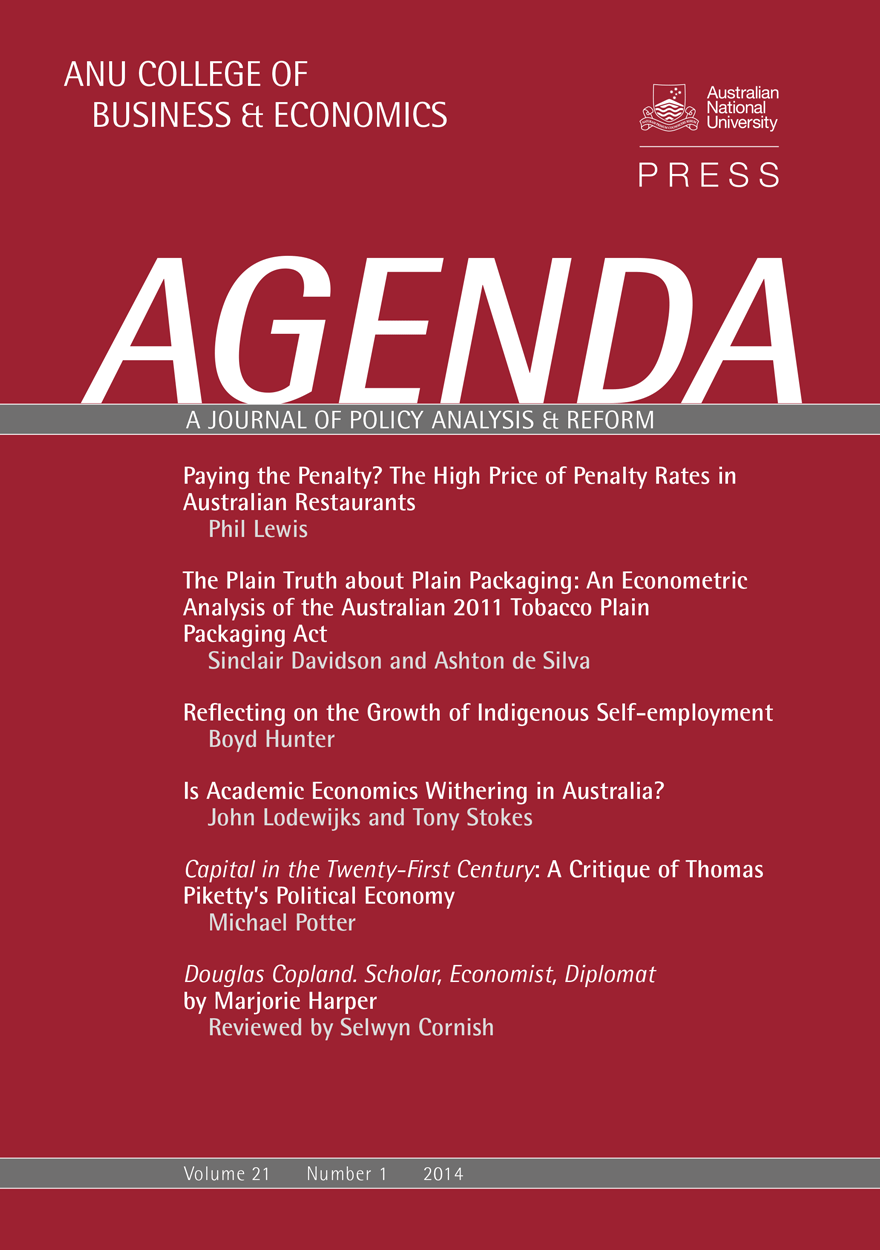Search titles
Displaying results 221 to 230 of 554.

Aboriginal History Journal: Volume 38 »
Edited by: Shino Konishi
Publication date: January 2015
Volume 38 features a special section on Western Australian Aboriginal history. Clint Bracknell translates and contextualises nineteenth-century Noongar songs. Amanda Nettelbeck considers the role of magistrates and justices of the peace in the ‘frontier legal networks’ of the Pilbara and Kimberley regions. Anne Scrimgeour traces the changing approach to the administration of Aboriginal people in the twentieth-century north-west through the biography of Laurie O’Neill, a former mounted policeman and travelling inspector. Craig Muller studies the history of the Wongatha of the north-east part of the Goldfields. Muller finds that Elkin’s account of his brief 1930 visit to the region was used as evidence in the recent Wongatha native title case without sufficient historical contextualisation. Together, the papers draw on rich archival sources, complicate our understandings of the way in which Aboriginal lives were controlled in the past, and highlight Aboriginal voices and perspectives.
The other four articles exploring Aboriginal histories from other parts of Australia. Nicholas Brodie reconstructs the life of Dalrymple Briggs, a Vandemonian woman of mixed-descent. Noah Riseman examines the lives of three Aboriginal servicemen who all had media profiles as successful examples of assimilation. The other two articles examine different non-Indigenous accounts of Aboriginal people and culture. Marguerita Stephens critically examines discourses on Aboriginal infanticide in colonial Victoria. The history of tourist visits to Palm Island, an Aboriginal reserve in Queensland is the focus of Toby Martin’s article.
Aboriginal History Inc. is a publishing organisation based in the Australian Centre for Indigenous History, Research School of Social Sciences, The Australian National University, Canberra.
For more information on Aboriginal History Inc. please visit aboriginalhistory.org.au.
Download for free
Not available for purchase

Circulating Cultures »
Exchanges of Australian Indigenous Music, Dance and Media
Edited by: Amanda Harris
Publication date: December 2014
Circulating Cultures is an edited book about the transformation of cultural materials through the Australian landscape. The book explores cultural circulation, exchange and transit, through events such as the geographical movement of song series across the Kimberley and Arnhem Land; the transformation of Australian Aboriginal dance in the hands of an American choreographer; and the indigenisation of symbolic meanings in heavy metal music. Circulating Cultures crosses disciplinary boundaries, with contributions from historians, musicologists, linguists and dance historians, to depict shifts of cultural materials through time, place and interventions from people. It looks at the way Indigenous and non-Indigenous performing arts have changed through intercultural influence and collaboration.

Global Warming and Climate Change »
What Australia knew and buried...then framed a new reality for the public
Authored by: Maria Taylor
Publication date: December 2014
1988: coming to grips with a terrifying global experiment
The Toronto conference statement made it clear that climate change would affect everyone. It called greenhouse gas atmospheric pollution an ‘uncontrolled, globally pervasive experiment whose ultimate consequences could be second only to nuclear war’. World governments were urged to swiftly develop emission reduction targets (The changing atmosphere: implications for global security, 1988).
Relevant to both Australian and overseas audiences, here is the untold story of how Australia buried its knowledge on climate change science and response options during the 1990s — going from clarity to confusion and doubt after arguably leading the world in citizen understanding and a political will to act in the late 1980s. ‘What happened and why’ is a fascinating exploration drawing on the public record of how a society revised its good understanding on a critical issue affecting every citizen. It happened through political and media communication, regardless of international scientific assessments that have remained consistent in ascribing causes and risks since 1990. How could this happen? The author examines the major influences, with lessons for the present, on how the story was reframed. Key have been values and beliefs, including economic beliefs, that trumped the science, the ability of changing political leaders and the mass media to set the story for the public, as well as the role of scientists’ own communication over time and the use and misuse of uncertainty.
For more information on this publication, plus book reviews, please see Maria Taylor’s author website.

Law and Democracy »
Contemporary Questions
Edited by: Glenn Patmore, Kim Rubenstein
Publication date: December 2014
Law and Democracy: Contemporary Questions provides a fresh understanding of law’s regulation of Australian democracy. The book enriches public law scholarship, deepening and challenging the current conceptions of law’s regulation of popular participation and legal representation. The book raises and addresses a number of contemporary questions about legal institutions, principles and practices:
How should the meaning of ‘the people’ in the Australian Constitution be defined by the High Court of Australia?
How do developing judicial conceptions of democracy define citizenship?
What is the legal right to participate in the political community?
Should political advisors to Ministers be subject to legal accountability mechanisms?
What challenges do applied law schemes pose to notions of responsible government and how can they be best addressed?
How can the study of the ritual of electoral politics in Australia and other common law countries supplement the standard account of democracy?
How might the ritual of the pledge of Australian citizenship limit or enhance democratic participation?
What is the conflict between legal restrictions of freedom of expression and democracy, and the role of social media?
Examining the regulation of democracy, this book scrutinises the assumptions and scope of constitutional democracy and enhances our understanding of the frontiers of accountability and responsible government. In addition, key issues of law, culture and democracy are revealed in their socio-legal context.
The book brings together emerging and established scholars and practitioners with expertise in public law. It will be of interest to those studying law, politics, cultural studies and contemporary history.

Diversity in Leadership »
Australian women, past and present
Edited by: Joy Damousi, Kim Rubenstein, Mary Tomsic
Publication date: November 2014
While leadership is an over-used term today, how it is defined for women and the contexts in which it emerges remains elusive. Moreover, women are exhorted to exercise leadership, but occupying leadership positions has its challenges. Issues of access, acceptable behaviour and the development of skills to be successful leaders are just some of them.
Diversity in Leadership: Australian women, past and present provides a new understanding of the historical and contemporary aspects of Indigenous and non-Indigenous women’s leadership in a range of local, national and international contexts. It brings interdisciplinary expertise to the topic from leading scholars in a range of fields and diverse backgrounds. The aims of the essays in the collection document the extent and diverse nature of women’s social and political leadership across various pursuits and endeavours within democratic political structures.

In the Eye of the Beholder »
What Six Nineteenth-century Women Tell Us About Indigenous Authority and Identity
Authored by: Barbara Dawson
Publication date: November 2014
This book offers a fresh perspective in the debate on settler perceptions of Indigenous Australians. It draws together a suite of little known colonial women (apart from Eliza Fraser) and investigates their writings for what they reveal about their attitudes to, views on and beliefs about Aboriginal people, as presented in their published works. The way that reader expectations and publishers’ requirements slanted their representations forms part of this analysis.
All six women write of their first-hand experiences on Australian frontiers of settlement. The division into ‘adventurers’ (Eliza Fraser, Eliza Davies and Emily Cowl) and longer-term ‘settlers’ (Katherine Kirkland, Mary McConnel and Rose Scott Cowen) allows interrogation into the differing representations between those with a transitory knowledge of Indigenous people and those who had a close and more permanent relationship with Indigenous women, even encompassing individual friendship. More pertinently, the book strives to reveal the aspects, largely overlooked in colonial narratives, of Indigenous agency, authority and individuality.
For more information on Aboriginal History Inc. please visit aboriginalhistory.org.au.

Power and International Relations »
Essays in Honour of Coral Bell
Edited by: Desmond Ball, Sheryn Lee
Publication date: November 2014
Coral Mary Bell AO, who died in 2012, was one of the world’s foremost academic experts on international relations, crisis management and alliance diplomacy. This collection of essays by more than a dozen of her friends and colleagues is intended to honour her life and examine her ideas and, through them, her legacy.
Part 1 describes her growing up during the Great Depression and the Second World War, her short-lived sojourn in the Department of External Affairs in Canberra, where she was friends with some of the spies who worked for Moscow, and her academic career over the subsequent six decades, the last three of which were at The Australian National University.
Most of Coral’s academic career was spent in Departments of International Relations. She was disdainful of academic theory, but as discussed in Part 2, she had a very sophisticated understanding of the subject. She was in many ways a Realist, but one for whom agency, in terms of ideas (the beliefs and perceptions of policy-makers) and institutions (including conventions and norms of behaviour), essentially determined events.
Part 3 is concerned with power politics, including such matters as Cold War competitions, crisis management, alliance diplomacy, and US and Australian foreign policies. She recognised that power politics left untrammelled was inevitably catastrophic, and was increasingly attracted to notions of Concerts of Power.
‘Coral would be touched by this collection of essays about her professional and personal life. The contributors offer honest, professional and insightful reviews of her many academic achievements and especially her ideas, many of them the forerunners of others’ work, that makes her one of the very best international relations and strategic thinkers.’
— Dr. Pauline Kerr, Asia-Pacific College of Diplomacy, The Australian National University
‘It’s a rare thing in an international relations expert to possess a balance of theory and experience, history and imagination, realism and hope. Coral had this, and she had a 19th-century prose style to match it. Through her writing she explained the chaos of international events and human affairs in simple and clear language to her baffled compatriots. For the rest of the world, she brought an antipodean temperament and perspective to the great questions of our time; she was our George Kennan in thick glasses, blue floral dress, white sneakers and a string of pearls.’
— Minh Bui Jones, The Lowy Interpreter, 5 October 2012

East Asia Forum Quarterly: Volume 6, Number 4, 2014 »
Publication date: November 2014
East Asia Forum Quarterly grew out of East Asia Forum (EAF) online, which has developed a reputation for providing a platform for the best in Asian analysis, research and policy comment on the Asia Pacific region in world affairs. EAFQ aims to provide a further window onto research in the leading research institutes in Asia and to provide expert comment on current developments within the region. The East Asia Forum Quarterly, like East Asia Forum online, is an initiative of the East Asia Forum (EAF) and its host organisation, the East Asian Bureau of Economic Research (EABER) in the Crawford School of Economics and Government in the College of Asia & the Pacific at The Australian National University.
Download for free
Not available for purchase

Agenda - A Journal of Policy Analysis and Reform: Volume 21, Number 1, 2014 »
Edited by: William Coleman
Publication date: November 2014
Agenda is a refereed, ECONLIT-indexed and RePEc-listed journal of the College of Business and Economics, The Australian National University. Launched in 1994, Agenda provides a forum for debate on public policy, mainly (but not exclusively) in Australia and New Zealand. It deals largely with economic issues but gives space to social and legal policy and also to the moral and philosophical foundations and implications of policy.
Subscribe to the Agenda Alerting service if you wish to be advised on forthcoming or new issues.
Download for free
Not available for purchase

Ngapartji Ngapartji »
In turn, in turn: Ego-histoire, Europe and Indigenous Australia
Publication date: November 2014
In this innovative collection, Indigenous and non-Indigenous scholars from Australia and Europe reflect on how their life histories have impacted on their research in Indigenous Australian Studies. Drawing on Pierre Nora’s concept of ego-histoire as an analytical tool to ask historians to apply their methods to themselves, contributors lay open their paths, personal commitments and passion involved in their research. Why are we researching in Indigenous Studies, what has driven our motivations? How have our biographical experiences influenced our research? And how has our research influenced us in our political and individual understanding as scholars and human beings? This collection tries to answer many of these complex questions, seeing them not as merely personal issues but highly relevant to the practice of Indigenous Studies.
I think this rich collection will become a landmark text and a favourite within Australian scholarship. I am keen to see it published so that I can recommend it to others
— Professor Emerita Margaret Allen, Gender Studies and Social Analysis, University of Adelaide
The idea was to explain the link between the history you have made and the history that has made you
— Pierre Nora



